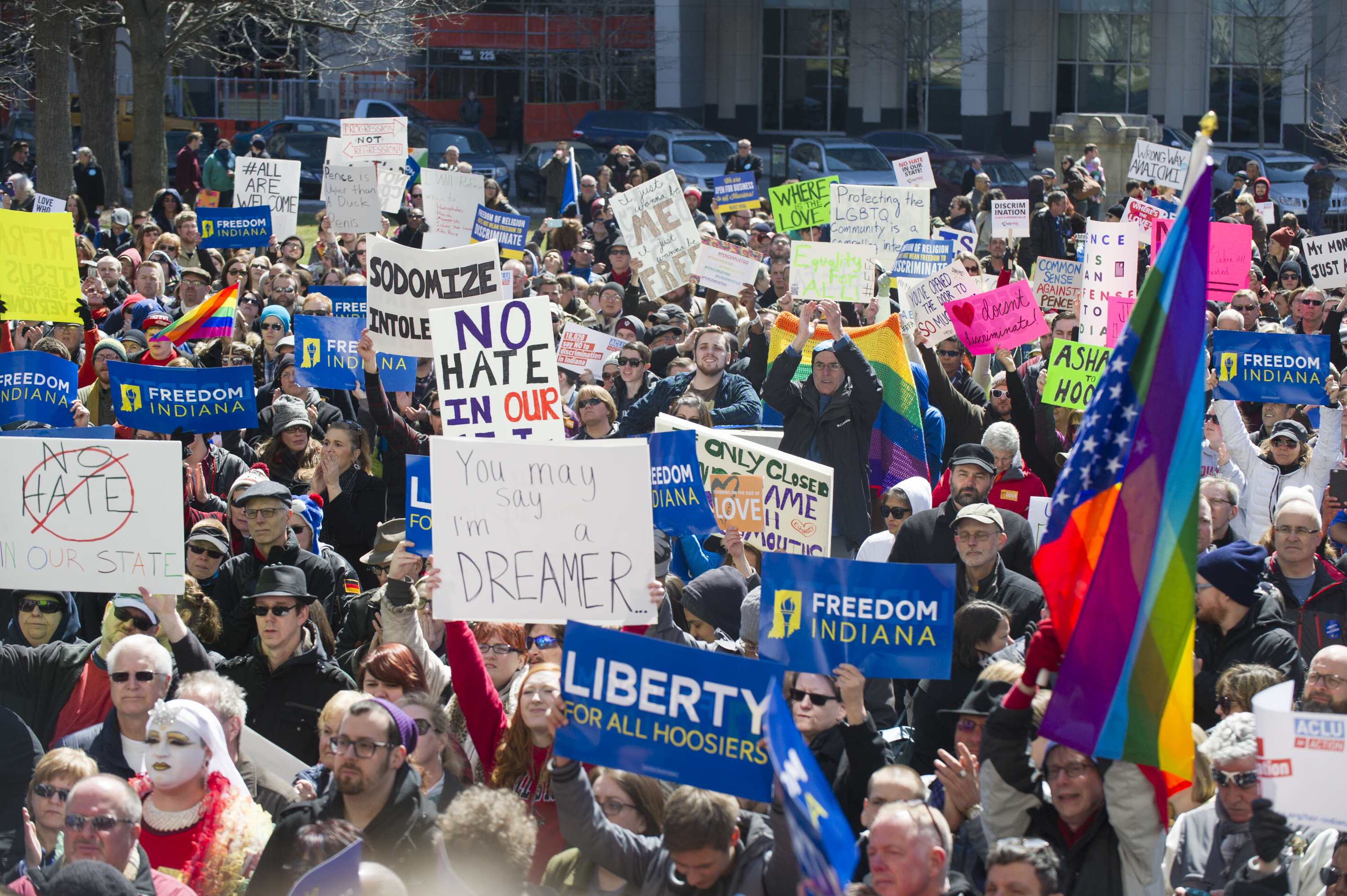The insane national freak-out over Indiana's religious freedom law
In a truly pluralistic society, we would respect Indiana's choice


A free daily email with the biggest news stories of the day – and the best features from TheWeek.com
You are now subscribed
Your newsletter sign-up was successful
The moral panic that a fundamentalist Christian armed with a packet of instant yeast and a stand mixer can inspire is something to behold.
I am speaking, of course, about the national freak-out that has greeted the passage of Indiana's version of the Religious Freedom Restoration Act (RFRA), which is based on legislation signed nearly unanimously by a Clinton-era Congress. The law applies a "balancing test" in judicial proceedings, where states have to prove a compelling state interest before burdening the practice of a religious belief, and it comes in response to concerns that religious business owners, like bakers and florists and the like, will be forced to participate in same-sex marriages.
The overreaction reached a sanctimonious crescendo when Apple CEO Tim Cook explained in The Washington Post that such laws are "not about religion." They are also allegedly bad for business. That the guy who made his career manipulating supply chains in China objects to small-time proprietors exercising their religious liberty rights is amusing. I suppose he prefers making money where governments stringently regulate religious belief.
The Week
Escape your echo chamber. Get the facts behind the news, plus analysis from multiple perspectives.

Sign up for The Week's Free Newsletters
From our morning news briefing to a weekly Good News Newsletter, get the best of The Week delivered directly to your inbox.
From our morning news briefing to a weekly Good News Newsletter, get the best of The Week delivered directly to your inbox.
Apple uses the same discretion Cook would deny others, such as when it removed a program from its store that articulated a traditional Christian view of marriage. Apple has every right to reject apps it finds unconscionable or distasteful. If only Cook was civil enough to extend others the same courtesy.
There's little historical evidence to suggest that Indiana's RFRA could be used in a general way to deny service to customers who are gay. RFRA statutes in other states have never successfully defended a proprietor from an anti-discrimination suit. All the speculation about the minor differences in Indiana's statute that allegedly make it a historical violation of civil rights is just that: speculation. It would be helpful if opponents of Indiana's RFRA compiled a list of the enormities that occur because of this law in the next five years. My bet is that there will be zero.
On the other side, it is rather easy to compile instances in which the RFRA produced laudable outcomes. There's the example of Kawal Tagore, a Sikh who was fired from the IRS for carrying a small knife that is the religious duty of all Sikhs to carry. She won recompense for her unlawful firing, thanks to the RFRA. Then there's Abdul Muhammad, a prisoner in Arkansas who won the right to grow a beard while in prison, in accordance with his religious duties.
And even if RFRA offered no protection to the traditionalist Christian baker and wedding photographer, the law of the land and our culture should. There is something truly paradoxical about the progressive desire to vindicate secularism by compelling objectors to participate in another person's marriage solemnities. That's the sort of thing the Puritans of Massachusetts Bay did.
A free daily email with the biggest news stories of the day – and the best features from TheWeek.com
Religious liberty — including the liberty not to participate in another's private ceremonies — is a liberal value. And liberty of conscience should be protected for all small proprietors, even those who are not religious, or even anti-religious. If a Catholic priest walked into his local print shop and asked the liberal owner to print pamphlets on the sinfulness of artificial birth control, she should be free to decline the job. To label her an anti-Catholic bigot, and to invoke the power of the state to destroy her business, reputation, and livelihood, would be monstrously cruel.
There is a difference between serving a customer and participating in an event that is fundamentally at odds with your religious beliefs. Take the case of Sweet Cakes of Oregon, which sold cupcakes to LGBT customers, but chose not to cater at a same-sex wedding.
For consistency's sake, the #BoycottIndiana activists who have discovered such passionate distaste for RFRA laws should own the totality of their views. They should work to repeal the laws across 19 states and the federal government. They should demand that the verdicts rendered under it are overturned. Kawal Tagore should be forced to surrender her religious artifacts. #BoycottIndiana should travel to Arkansas and protest at the prison where Abdul Muhammad is held. Tim Cook should offer to shave Muhammad's beard.
Or maybe we could find a way to step back from where the culture war is leading us. Maybe these dissenting wedding vendor cases are rather rare. Maybe they are not an imminent threat to anyone's wedding in particular, or to the nation at large. Maybe not every difference between client and proprietor has to be a prelude to intra-state economic sanction. And maybe, just maybe, America can try to practice real pluralism.
Michael Brendan Dougherty is senior correspondent at TheWeek.com. He is the founder and editor of The Slurve, a newsletter about baseball. His work has appeared in The New York Times Magazine, ESPN Magazine, Slate and The American Conservative.
